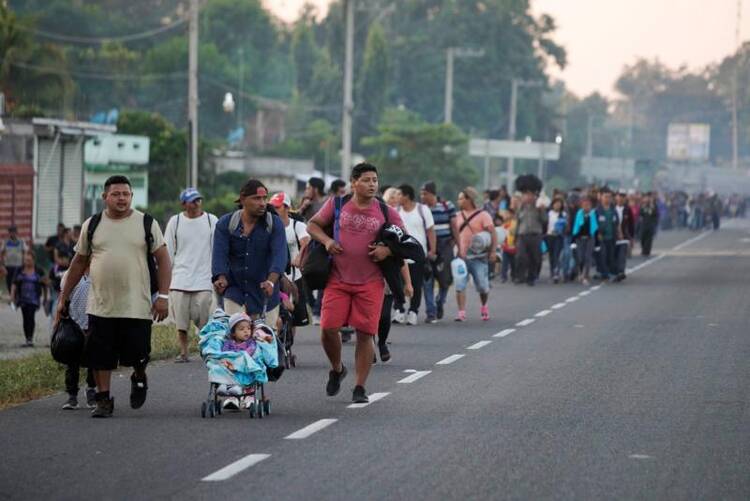NEW YORK (CNS) -- A delegation that includes the head of Catholic Charities of the New York Archdiocese, union leaders, state officials and representatives of humanitarian aid agencies are visiting the three Central American nations that now face a cutoff of U.S. aid ordered by President Donald Trump.
During the April 22-26 fact-finding trip, the delegation planned to assess conditions in Honduras, Guatemala and El Salvador that have sparked years of migration northward to the U.S.
Msgr. Kevin Sullivan, executive director of Catholic Charities of the New York Archdiocese, told reporters during a news conference April 11 at the agency's Community Services - Immigration Legal Center in lower Manhattan that the delegation wanted to better understand the on-the-ground conditions people face daily in the Northern Triangle countries.
Joining Msgr. Sullivan on the fact-finding mission were New York State Comptroller Thomas DiNapoli, Stuart Appelbaum, president of the Retail, Wholesale and Department Store Union, other Catholic Charities representatives and officials from Catholic Relief Services, the U.S. bishops' overseas relief and development agency.
Briefing participants fielded questions related to immigration and border issues, unaccompanied minors and the impact of U.S. policies on families at the border and in New York.
"We are very, very pleased that so many of our Catholic Charities partners are here today," Msgr. Sullivan said, "because when we are at our best as a country, and as a city and as a state, we don't do things alone. We do them in partnership with those of goodwill who want to make our city, our state, our nation, a more compassionate, a more fair place."
Msgr. Sullivan acknowledged the concern and care New York Cardinal Timothy M. Dolan has "for immigrants, particularly unaccompanied minors," throughout the years, "but especially last summer when we had the crisis of separated children."
The number of those who continue to come to the United States is increasing, Msgr. Sullivan said. "The partners that we have in New York City and New York state, although stretched, continue to provide compassionate, high quality care," through housing, social and legal services, and counseling.
"Today," Msgr. Sullivan said, "we want to say that as New Yorkers, that we continue to be the city that welcomes and ... encourages newcomers because we're stronger when we welcome and we open our doors to them."
Cardinal Dolan attended the news briefing along with David Hansell, New York City commissioner of the Administration for Children Services, New York City Council Speaker Corey Johnson and other legal and social service providers.
in response to a reporter's question about whether there is a limit to how many people can come into the country, cited some compelling statistics, Msgr. Sullivan said the archdiocese believes in secure borders as well as "a generous, legal, immigration policy."
"We also believe that there is a need for people to earn a way to remedy a situation that they may have gotten themselves into," he said.
Msgr. Sullivan said in traveling clinics Catholic Charities conducts throughout the New York metropolitan area, staffers see about 100 immigrants on a given day "who don't have the right documents. At the end of the day, 25 of those 100 really just were unaware that they could have the right documents."
He also shared a table listing the population densities of 225 countries. "The United States, on that list, is 175th from the top of dense countries," he said.
DiNapoli anticipated the trip would yield information "from the ground" to share with policymakers in New York state as well as some national leaders.
Cardinal Dolan said that for more than a century Catholic Charities has welcomed, helped and encouraged immigrants and refugees.
"We're going to keep doing it, but we can't do it by ourselves," the cardinal said. "And that's why the wisdom of a morning like this shows me the magnificent choreography of all the different partnerships that we have. So I thank our partners. Do we ever need you and do we ever appreciate you."
Bitta Mostofi, commissioner of the city's Office of Immigrant Affairs, said the "false narrative of people just coming here for no reason, or that they're not children, or that they're not fleeing extreme violence, is just that -- it's false."
"And it's each and every one of our jobs," she said, "to ensure that we're telling the truth about why people are coming, that we're telling the truth about what it means if we leave people behind."
Appelbaum, the union president, said the trip to the Central American nations could not have come at a more appropriate time. "We are leaving the day after Easter, which is also the middle of Passover.
"Passover was the story of a migration of people from their homes leaving in desperation. What happened so long ago should resonate with all of us in terms of what is happening today," he added.
To be true "to our faiths" and "to our city," Appelbaum said, "we have to be speaking out at this time."










